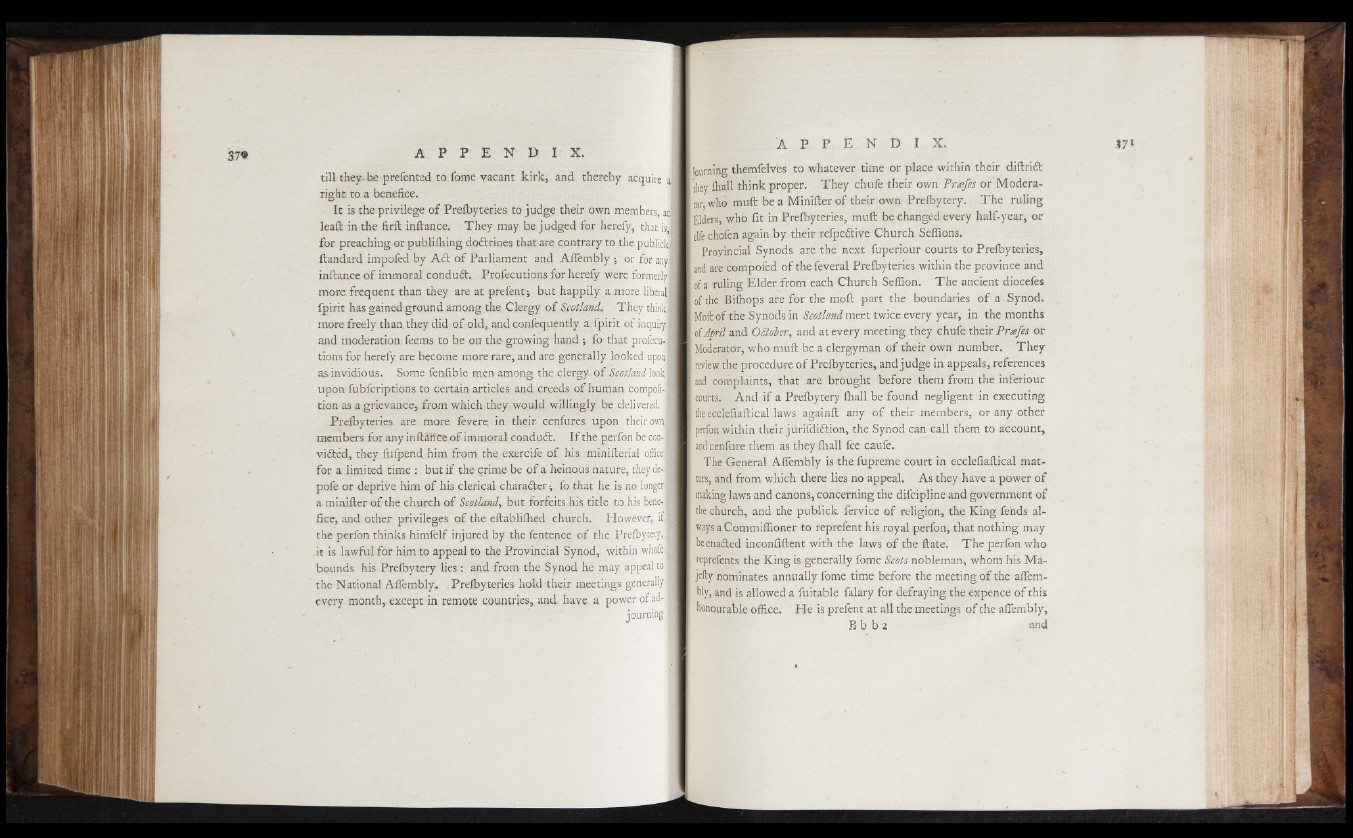
till theybe prefented to fome vacant kirk, and thereby acquire J
right to a benefice.
It is the privilege of Preibyteries to judge their own m em b e r s, at :;
leaft in the firft inftance. They may be judged for herefy, th at i s *
for preaching or publiihing doftrines that are contrary to the p u b lic™
ftandard impofed by A ft of Parliament and Aflembly ; or fo r any ■;
inftance of immoral conduft. Profecutions for herefy were fo rm e rly *
more frequent than they are at prefent; but happily a m o r e lib e ra l*
fpirit has gained ground among the Clergy of Scotland. T h e y th in k *
more freely than they did of old, and confequently a fpirit of in q u iry *
and moderation feems to be on the growing hand ; fo that profecu- j
tions for herefy are become more rare, and are generally lo o k e d upon i
as invidious. Some fenfible men among the clergy of Scotland look
upon fubfcriptions to certain articles and creeds of human c om p o fi®
tion as a grievance, from which they would willingly be d elivered , ■
Preibyteries are more fevere. in their cenfures upon th e ir o w n *
members for any inftance of immoral conduft. I f the p e r fo n be c o n ®
vifted, they fufpend him from the exercife of his m in if t e r ia l o ffice®
for a limited time : but if the crime- be of a heinous nature, th ey d e -®
pofe or deprive him of his clerical charafter; fo that he is n o lo n ger®
a minifter of the church of Scotland, but forfeits his title to h is b en e-®
fice, and other privileges of the eftablilhed church. H o w e v e r , i f®
the perfon thinks himfelf injured by the fentence of the P r e ib y te r y ,®
it is lawful for him to appeal to the Provincial Synod, w ith in w h o le®
bounds his Preibytery lies : and from the Synod he may a p p e a l t o ®
the National Aflembly. Preibyteries hold their meetings g e n e r a lly®
every month, except in remote countries, and have a p o w e r o f a d -®
jo u rn in g j
burning themfelv'es to whatever time or place within their diftrift
they ihall think proper. They chufe their own Prafes or Moderator,
who muft be a Minifter of their own Preibytery. The ruling
Elders, who fit in Preibyteries, muft be changed every half-year, or
elfe chofen again by their- refpeftive Church Seflions.
Provincial Synods are the next fuperiour courts to Preibyteries,
! and are compofed of the feveral Preibyteries within the province and
of a ruling Elder from each Church Seflion. The ancient diocefes
of the Biihops are for the moft part the boundaries of a Synod.
Moil of the Synods in Scotland meet twice every year, in the months
of April and October, and at every meeting they chufe their Prafes or
Moderator, who muft be a clergyman of their own number. They
review the procedure of Preibyteries, and judge in appeals, references
and complaints, that are brought before them from the inferiour
courts. And if a Preibytery ihall be found negligent in executing
the ecclefiaftical laws againft any of their members, or any other
perfon within their jurifdiftion, the Synod-can call them to account,
and cenfure them as they ihall fee caufe.
The General Aflembly is the fupreme court in ecclefiaftical matters,
and from which there lies no appeal. As they have a power of
making laws and canons, concerning the difcipline and government of
the church, and the publick fervice of religion, the King fends always
a Commiflioner to reprefent his royal perfon, that nothing may
beenafted inconftftent with the laws of the ftate. The perfon who
, reprefents the King is generally fome Scots nobleman, whom his Ma-
jeity nominates annually fome time before the meeting of the aflembly,
and is allowed a fuitable falary for defraying the expence of this
! honourable office. He is prefent at all the meetings of the aflembly,
B b b 2 and